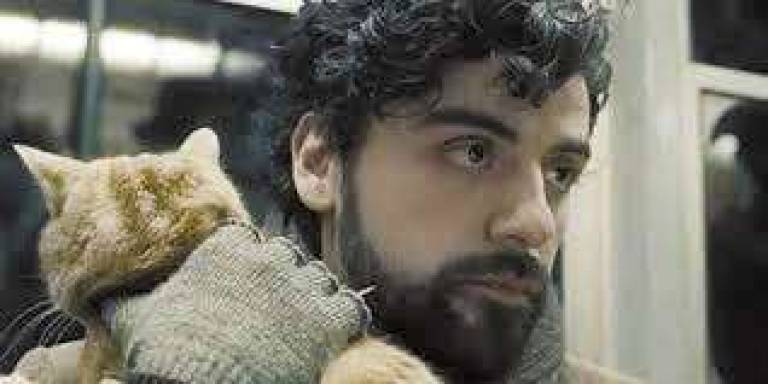Dangling Dylan

The Coens examine Pop and Self
When an apparition of Bob Dylan appears in Inside Llewyn Davis, it underscores the Coen Brothers' abiding ambivalenceabout theirJewishness. Dylan, the oracular pop-star-prophet -outsider from Minnesota (like the Coens) represents an advance on mainstream culture and power that troubles the Coen Brothers' fascination with American character.
Inside Llewyn Davis is the latest go-round for these clever lads' interest in the agonies of personal identity amidst a heartless society not entirely their own. Llewyn (Oscar Isaacs), a dark, curly-haired folksinger in 1961 New York City, is barely over the suicide of his singing partner. He's economically strapped, homeless, living off patronizing friends and virtually begging for a solo recording career while also booty-begging for understanding from a free-spirit Greenwich Village girl (Cary Crybaby Mulligan) he might have impregnated.
Knocking at the door of WASP-Americana--the 50s-60s folk-music craze-Welsh-Italian Llewyn is a modern Wandering Jew who, like Dylan, dare not speak his ethnicity (his name is a Welsh creation like Dylan's chosen's moniker). The Coens cutely symbolize Llewyn's rootlessness in his constant chasing after a friends' runaway Calico cat named Ulysses--more cuteness evoking the Homeric wandering of the Coens' O Brother Where Art Thou? While that 2001 film was a surprising rich excursion into country music culture and America's racial legacy, Inside Llewyn Davis offers no surprises. It's more solemnthan funny.
This is a thornier problem than simply the Coens' self-pleasing sarcasm, their intellectual narcissism. They're not clever by half; it's second nature to these new era movie brats. But the self-pleasing self-indulgence may offer less meaning in itself than it does to them and their fans. That eye-wink title, Inside Llewyn Davis, refers to his non-selling solo debut album (he stashes a milk crate full of the vinyl discs at a friend's apartment) as well as a teasing exploration of his soul. Problem is, Llewyn's "soul" is shown without the insight into Jewish tradition (which made A Serious Man extraordinary) but as a series of beautifully-tooled, second-hand motifs.
Here, the Coens revisit the untrustworthy pop culture of Barton Fink and the Jewish paranoia of A Serious Man. Combined, they question the ethics of American pop culture and the neediness of Jewish artists. Been there, atoned for that.
Fans and critics who are familiar with the Coens will overrate these details. Problem is, Inside Llewyn Davis (withthe lament"Where is its scrotum?!!" and jokey references toDisney's The Incredible Journey) question Jewish alienation superficially. HBO's Flight of the Conchords was a more trenchant display of outsiders'music biz alienation. But Oscar Isaac's Llewyn, with his Hoffman-Pacino whine, seems disconnected from his own singing and lacks thegreat feeling he showed in his role as the remorseful pop star in the high school reunion filmTen Years.
Critics who cluelesslypraise T-Bone Burnett's musical production ignore Burnett's drab musicianship. The musical banality of Inside Llewyn Davis is its greatest problem--impersonal, apoliticalfolk music. Llewyn, a modern version of Saul Bellow's Dangling Man--searching for his place in society andthe universe, dangling between expectation and reality--really is less talented thanhis deeply enviedWASP competitor GI Troy Nelson (Stark Sands) who has the unfathomablegift of connecting to listeners.
Inside Llewyn Davis doesn't connect. The Coens are facetious about Llewyn's personal crisis. That's why the movie ends the same way as Philip Kaufman's The Wanderers with Dylan revolutionizing Jews' and the world's selfconsciousness.The slick, talented Coens may please fans who are alreadyfamiliar with their habits but, sadly,for gifted, witty film artists, the Coens' Inside Llewyn Davis says nothing new.
Follow Armond White on Twitter at 3xchair